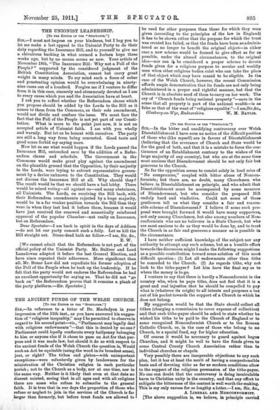THE ANCIENT FUNDS OF THE WELSH 011URCH.
[TO THE EDITOR OF THE "SPECTATOR."]
Sin,—In reference to a letter of Dr. Mazfadyen in your impression of the 11th inst., as you have answered his sugges- tion of " religious inequality," may I be permitted to observe in regard to his second point—viz., "Parliament may legally deal with religious endowments "—that this is denied by no one Parliament could legally confiscate every halfpenny belonging to him or anyone else if it chose to pass an Act for that pur- pose and it was made law, but should it do so with respect to the ancient funds of the Welsh Church the question is, Would such an Act be equitable (using the word in its broadest sense), just, or right? The tithes and glebez—with unimportant exceptions—were voluntarily given by landowners for the ministration of the Christian religion in each particular parish ; not to the Church as a body, nor at one time, nor in the same way. Neither is it likely that even at that date no dissent existed, seeing that in all ages and with all religions there are some who refuse to subscribe to the general faith. It is true that in our days the proportion of those who refuse or neglect to join in the services of the Church is far larger than formerly, but before trust funds are allowed to
be used for other purposes than those for which they were given (according to the principles of the law in England) it has to be shown either that the purpose for which the trust was created has failed, or that the funds have been so adminis. tered as no longer to benefit the original object—in either case a new scheme would be framed to give effect as far as possible, under the altered circumstances, to the original idea—nor can it, be considered a proper scheme to devote funds given for a religious purpose to secular and worldly uses when other religious bodies exist who can take the place of that object which may have ceased to be eligible. In the case of the Welsh Church, however, the recent Commission affords ample demonstration that its funds are not only being administered in a proper and rightful manner, but that the Church is in absolute need of them to carry on her work. The cry of " Church funds being national property "—save in the sense that all property is part of the national wealth—is as false as that of the want of "religious equality."—I am,Sir,&c.,
Glasbury-on-Wye, Radnorshire. W. M. BAYLIB.


















































 Previous page
Previous page